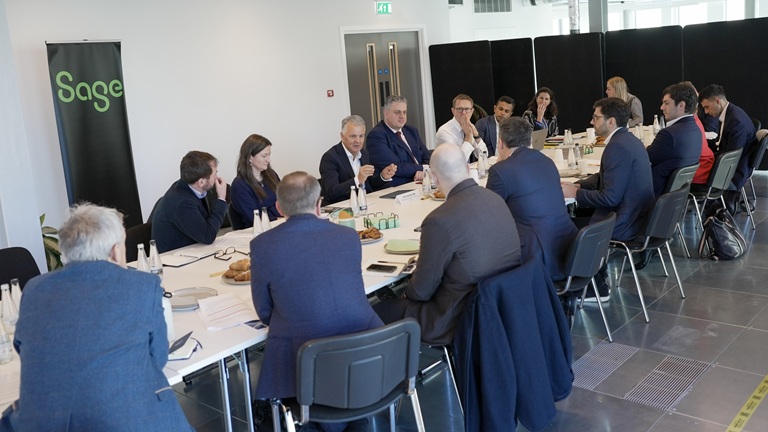What it'll take to get more SMEs adopting technology in 2026
)
Posted: Wed 26th Nov 2025
10 min read
At Sage's London office, small business leaders, tech firms, banks, business networks and officials sat down with Small Business Minister Blair McDougall MP to answer a single question: how do we turn yet another set of recommendations on SME digital adoption into visible change in 2026?
The discussion, based on the SME Digital Adoption Taskforce's final report, was kept intentionally practical.
No presentations, no glossy slides, just what people around the table were prepared to do next.
Why this can't wait
The Minister opened with the stakes.
SMEs are still the "lifeblood" of the UK economy, but productivity among smaller firms has fallen by 0.7% over the last year. Many have survived repeated shocks, but they aren't getting more productive.
The Minister set out a simple equation: if small business productivity grows by just 1% a year across the economy, that could be worth around £320 billion over the life of this Parliament.
Role of technology
The government is ready to make "big bets" on technology as a driver of that growth, but only if small firms actually use the tools available.
Right now, adoption is patchy. New analysis discussed in the room suggests only about one in 10 sole traders uses accounting software.
A third still use pen and paper, most rely on spreadsheets and bank statements, and a large share of firms have never seriously considered AI. Confidence to try remains low.
The Minister acknowledged that the UK lags behind other G7 countries when it comes to tech investment among small businesses.
His ambition is for the UK's SMEs to become the most digitally capable and AI-confident in the G7, and he was clear that the Small Business Plan is the start of that journey, not the culmination.
A shared to-do list, not a new wishlist
The Taskforce's 10 recommendations range from foundational tech platforms and AI tools to electronic invoicing (e-invoicing).
Around the table, they were treated less as a list of requests and more as a joint to-do list for government, industry and small business networks.
Over the next year, the focus will be on which recommendations can genuinely be activated in 2026, where early wins are most likely and how progress will be tracked publicly.
That demands shared ownership rather than another set of parallel initiatives. The Minister welcomed that framing and invited continued "constructive challenge" on pace and delivery.
What's really holding SMEs back
The bulk of the discussion covered why adoption remains slow despite the benefits being clear and a number of schemes being available.
Three themes stood out:
Leadership and mindset: Many founders are inventive about what they sell, but reluctant to rethink how they run the business.
In more established firms, senior leaders may be less confident with technology and quietly push decisions into the long grass.
Time, headspace and complexity: Owners are stretched. They ignore generous tax reliefs and grant programmes because the process feels too complex and draining.
The same "I just can't face it" instinct applies to choosing software or engaging with new support.
Diverse needs, blunt tools: A sole trader, a three-person agency and a 200-person manufacturer have very different realities. Generic offers aimed at "SMEs" risk feeling too abstract to be useful.
The roundtable group kept returning to the role that trusted intermediaries play.
For most small firms, accountants, bookkeepers, local chambers, trade bodies and peer groups shape decisions far more than national campaigns or central websites.
If digital initiatives bypass those networks, they're unlikely to reach the firms who most need help.
Several people also stressed that basic management capability is a foundation.
Where leadership, planning and measurement are weak, businesses tend to buy software but not embed it, turning technology into a cost rather than a driver of growth.

What works on the ground
Against that backdrop, the group compared examples of what is already working.
Stories had far more power than statistics. Relatable case studies of firms saving time, reducing late payment or growing exports with simple tools resonated more than abstract numbers around productivity.
The Minister echoed this, noting that many of his own decisions around tech in his household – from broadband to streaming – were driven as much by a fear of missing out as by any formal analysis.
Used carefully, that "FOMO" can be a strength. If shop owners see similar businesses in their area using AI to manage stock or social media while they struggle on without it, it serves as a natural prompt for them to act.
Digital champions and regulation
Several members of the roundtable argued for campaigns built around "hero firms" in each sector so that adopting digital technology feels normal and not exceptional.
Inside businesses, the idea of "digital champions" landed well.
Rather than expecting already overloaded owners to lead every technical decision, the suggestion was to empower mid-level staff with the time and support to explore tools, propose changes and bring colleagues with them.
Tech firms around the table were clear that the pitch has to be simple and honest. Vague promises of "transformation" don't cut through.
Specific, near-term gains do: saving three or four hours a week on admin is a far easier sell than a marginal uplift in productivity.
Regulation has a part to play. Changes such as Making Tax Digital and possible e-invoicing mandates create natural deadlines.
The consensus was that these can be helpful triggers if matched with clear communication and practical support, rather than simply new penalties.
Government as convenor and catalyst
On the government's role, the emphasis was on doing fewer things better.
The Minister was candid that government should not try to deliver everything. Its strengths lie in convening, setting direction and removing friction.
Roundtable members called for overlapping initiatives across departments to be better aligned, and for ministers to be armed with specific, detailed proposals they can push inside Whitehall.
Procurement came up repeatedly. Too often, public bodies default to "how we've always done it" and shut out innovative, digitally-enabled suppliers.
There was appetite to use procurement more deliberately to reward adoption and spread good practice, without turning it into another box-ticking exercise.
The group also saw value in a single, recognisable campaign or brand for SME digital support. At present, owners face a patchwork of logos, portals and one-off projects.
A shared umbrella, backed by government and industry but delivered through trusted networks, was seen as a way to cut through noise rather than add to it.
The Minister acknowledged the reality of departmental complexity and tight timetables, but restated his intention to make "big bets" on technology and to keep working with industry and intermediaries to turn ambition into action.
Where the group landed
The session ended with a focus on delivery. There was agreement to lean much more heavily on existing local networks as the main channels for training, stories and advocacy, rather than creating new structures.
Roundtable members committed to working up a unified campaign concept and messaging platform that can sit above individual schemes, combining national visibility with local delivery.
A small number of follow-up sessions, including with Number 10, will be used to bring that campaign into line and agree a delivery plan for 2026.
By spring, the group expects to report back with something more tangible than a list of meetings – evidence that more small firms are actually using tools that save time, reduce risk and help them grow.
The mood matched the scale of the challenge: clear-eyed about how far there is to go, but united that digital adoption is both an economic necessity and a major opportunity.
Government, industry and SME networks are largely in agreement on what needs to happen. The task now is to keep it simple, stay co-ordinated and turn a long list of recommendations into practical change for small firms in every part of the UK.
People also read
The case for a national CTO-as-a-service programme – and why it matters
How government and businesses can partner to drive small business adoption of AI
Make your small business more secure with the free Tech Hub tool
Get tailored recommendations, join virtual workshops, connect with expert advisers and find practical resources. Take me to Tech Hub now
Get business support right to your inbox
Subscribe to our newsletter to receive business tips, learn about new funding programmes, join upcoming events, take e-learning courses, and more.
Start your business journey today
Take the first step to successfully starting and growing your business.
Join for free

